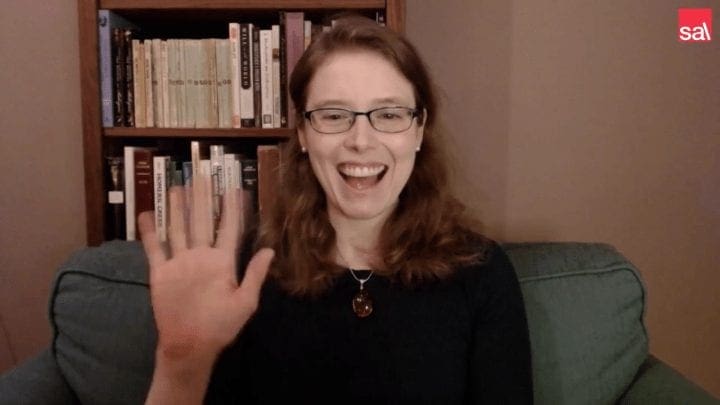
Finding a Home in the Odyssey: A WITS Intern Reflects on Event with Madeline Miller
February 17, 2021
Akshaya Ajith, a high school student doing a remote internship with the Writers in the Schools program at SAL, attended SAL’s Literary Arts Series event with Madeline Miller, the author of Circe and Song of Achilles, on January 27, 2021. Read on to hear her reflections.
By Akshaya Ajith, WITS Intern
Through her rich interpretation and retelling of the Odyssey under the lens of a villainized female character, Madeline Miller’s Circe has stunned readers. Its exploration and reshaping of classic tales have combated the failures against female characters, as it plunges into an uncomfortable narrative in which women like Circe hold their power. Perhaps the most striking theme within Miller’s delve into the Odyssey is the uncovering of stories written over, that sustain the gravitational pull of classic tales that continue to resonate with us.
Madeline Miller’s first time reading the Iliad in Greek was “electrifying,” as she told the audience during her January 27th event with Seattle Arts & Lectures. The tales of the Odyssey and the Iliad have remained classics in our world as they tell stories that “resonate down through the centuries.” Their characters have incredible strengths, yet such great follies, allowing for the stories surrounding them to connect to our own. Despite the monsters and gods, the universal themes ground these tales into reality, as the lush language envelops readers into a fantastic world. “Getting to lose myself in the poetry, the beauty of the language, the suppleness [of the words]” was magical to Miller as she leapt into her studies of the Iliad, and later, the Odyssey.
Certainly, both the Iliad and the Odyssey‘s rich emotional narratives speak to broader themes and have been loved dearly by readers like Miller, but the obvious lack of well-thought-out female characters has been a common disappointment. “For the most part,” Miller noted, “[Female characters] were really sidelined.” Female villains were characterized as “monstrous” and punished for the power they wielded, while other female characters remained names or deaths to motivate the male hero. Like other female characters within classics, Circe—a witch who turned men into pigs—had potential, but instead, within her conflict with Odysseus, she is submissive and yields almost immediately to Odysseus, inviting him to her bed.
Watching the subjugation of Circe on her knees to Odysseus eventually fostered what Miller called a “profound feeling of disappointment”—especially over Circe’s unfairly bad reputation. Her depiction as a “man-hater” or “scare figure” in later literature brandished a larger stain on the complexities of her character in Homer’s Odyssey. Circe’s demonization through literature and pop culture has shaped the translation and understanding of Odyssey—but doesn’t answer to the more benevolent images of Circe also woven through the tale. Her eventual label of being a “witch,” as a derogatory put-down, is connected directly to fear of her power—more specifically, fear of women holding power.
As Miller noted during her talk, “Witch is still a word that we use to insult women who have power that make us uncomfortable.” Even within modern times, we are intolerant with regards to women wielding power. Through our political landscape and our interactions within our own communities, women with authority are demonized, whether through derogatory terms, or through constant policing. Eventually, the disparagement against women in power enables others to continue the cycle of breaking women down and the misogynic ideas that put down influential women. Miller may not have a clear-cut solution, but one may be, she said, “To keep putting women in power, so eventually it breaks that cultural idea.”
Within Circe, Miller does exactly that within the world of the Odyssey. Miller’s retelling allows Circe to be “an agent of her own life,” rather than an “objectified” female character buried under Odysseus’ story, warped by pop culture into a warning against powerful women. Additionally, Miller’s reinterpretation expands upon the bare bones of Circe’s character and aptly portrays a woman with power, while questioning the more patriarchal and misogynistic nature of classical stories on women. Miller noted that common throughout classics is the idea that “if [a female character] manage[s] to claw [her] way up” to a position of power, “it can just be [her].”
The notion surrounding the acceptability of only one woman in succeeding invades Miller’s narrative, as it showcases the harm of internalized misogyny within Circe, her mother, and a multitude of female characters; each put down the other as they strive to claim their power and their voice. Circe’s internalized misogyny is a significant element within Miller’s novel, and it reflects upon the damaging impacts of patriarchal ideas—but Circe’s act of rising above it is just as important. Illuminating stories like Circe’s allow us, as readers, to challenge our own assumptions regarding internalized misogyny, as Circe does. The beauty of Circe’s overcoming of patriarchal ideas are found in the supportive female friendships she creates that eventually allow her to find her own nostos—her home—just as Odysseus does within Homer’s Odyssey.
The concept that there is only space at the table for one woman is not excluded to classical literature—it is found within politics, in the workplace, and in any leadership position. Miller’s solution of getting more women into positions of power and of working to actively challenge assumptions regarding influential women are showcased in Circe, and have made broader impacts on societal views of women with authority—like the reclaiming of the word “witch” as a celebration of female power, rather than a derogatory term. But just as important, the exposure to a variety of “sidelined” stories and characters have a profound influence on how we view the world around us, and how we view ourselves.
“Drawing […] inspiration from Circe, as goddess of transformation,” Miller said, “The best way forward is to allow ourselves to learn and grow and absorb new ideas […] to really bear witness and listen and not allow yourself to become rigid or fixed.” Perhaps, just as Circe found her nostos through her wisdom and challenge to oppressive social norms, we can find ours through the continuous work of seeking out stories that provoke important and uncomfortable conversations.
 Akshaya Ajith is a sophomore at the Overlake School. She is the founder of The TimeTurner Project and the host of the TimeTurner Podcast. Akshaya has been a WITS student for three years and continues to work with SAL as a student journalist. Akshaya has written two published poems, “Imperfect” and “I,” with WITS as well as a short story featured in an anthology of student writing. Akshaya is passionate about promoting political awareness, community organizing, and working to find solutions to social issues. She continues to write in her free time.
Akshaya Ajith is a sophomore at the Overlake School. She is the founder of The TimeTurner Project and the host of the TimeTurner Podcast. Akshaya has been a WITS student for three years and continues to work with SAL as a student journalist. Akshaya has written two published poems, “Imperfect” and “I,” with WITS as well as a short story featured in an anthology of student writing. Akshaya is passionate about promoting political awareness, community organizing, and working to find solutions to social issues. She continues to write in her free time.